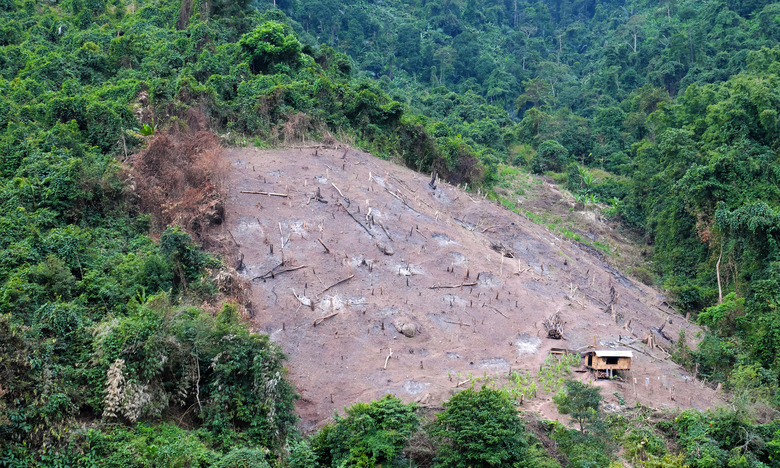How Have Humans Affected Our Planet's Biodiversity In Both Positive & Negative Ways?
Human activity impacts Earth's biodiversity in negative ways for the most part, though some human activity may benefit it or combat its decline. An ecosystem's diversity and its health are directly tied together. The web of relationships in a complex environment such as a rainforest means that many species depend on each other. Genetic diversity among individuals in populations better equips organisms to deal with disaster or disease.
TL;DR (Too Long; Didn't Read)
From focusing on few crop species to introducing new flora and fauna — intentionally or unintentionally — into an environment, human activity has largely harmed biodiversity on Earth. This can also make species less resistant to disease and climate change. However, humans have made strides in recent years to increase genetic diversity.
Habitat Destruction and Hunting
Habitat Destruction and Hunting
As the human population grows, so too does the amount of land it requires for food. The increase in the amount of cropland from 1950 to 1980 was greater than the growth in cropland from 1700 to 1850, and humanity's constantly-growing population requires more land for transportation and housing. As humans convert Amazon rainforests to cropland or pave over the natural habitats of many species, the ecosystem's ability to sustain over and diverse forms of life decreases. In some cases, they face extinction.Some species have also been driven to extinction by hunting or overharvesting. Some species of fish, for example, have been overharvested and their populations are in rapid decline.
Genetic Diversity Is Important for Disease Resistance
Genetic Diversity Is Important for Disease Resistance
Modern agriculture damages biodiversity in another way: farmers around the world adopt standardized varieties of crops such bananas, soy, corn, and rice. As farmers replace local varieties by the new standard, the genetic diversity of these species decreases, and some useful genes may eventually disappear altogether from the population. Ultimately, the species is less adept at fighting diseases, and the removal of some beneficial genes may hinder a species's ability to withstand environmental changes.
Humans Introduce New Harmful Species to Existing Habitats
Humans Introduce New Harmful Species to Existing Habitats
Humans bring a species from one continent or island to another frequently — sometimes intentionally and on other occasions by accident. In detrimental cases, these newcomers, called invasive species, rapidly outcompete native species and drive them to extinction, thereby reducing the biodiversity of an area. During the Second World War, humans accidentally introduced brown tree snake to the island of Guam — ever since then, the number of bird and reptile species on the island has rapidly plummeted.
Modern Human Efforts to Fight Declines in Biodiversity
Modern Human Efforts to Fight Declines in Biodiversity
The human impact on biodiversity has largely been negative — over the past few centuries, the extinction rate has climbed to as much as a thousand times the estimated natural rate. Nonetheless, human efforts to conserve biodiversity in some regions of the world succeed from time to time. Creating protected areas such as nature preserves help protect biodiversity or slow its decline. Managing fisheries and logging operations so that resources are only removed at a sustainable rate also helps conserve some biodiversity.
References
- Stanford Encyclopedia of Philosophy: Biodiversity
- United Nations Millennium Ecosystem Assessment: Biodiversity
- Biodiversity BC: Major Impacts to Biodiversity in British Columbia (Excluding Climate Change)
- Goshen College: Human Impact on Biodiversity
- World Bank: Biodiversity Conservation in the Context of Tropical Forest Management
- Nature Trust BC: What Can We Do?
Cite This Article
MLA
Brennan, John. "How Have Humans Affected Our Planet's Biodiversity In Both Positive & Negative Ways?" sciencing.com, https://www.sciencing.com/humans-affected-planets-biodiversity-positive-negative-ways-2286/. 23 April 2018.
APA
Brennan, John. (2018, April 23). How Have Humans Affected Our Planet's Biodiversity In Both Positive & Negative Ways?. sciencing.com. Retrieved from https://www.sciencing.com/humans-affected-planets-biodiversity-positive-negative-ways-2286/
Chicago
Brennan, John. How Have Humans Affected Our Planet's Biodiversity In Both Positive & Negative Ways? last modified August 30, 2022. https://www.sciencing.com/humans-affected-planets-biodiversity-positive-negative-ways-2286/
